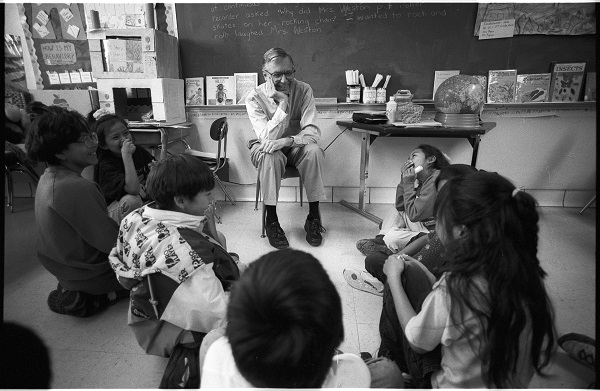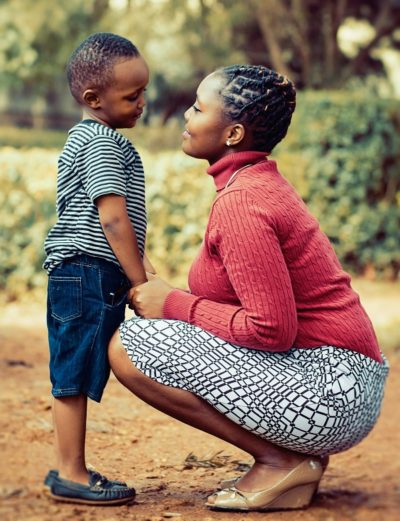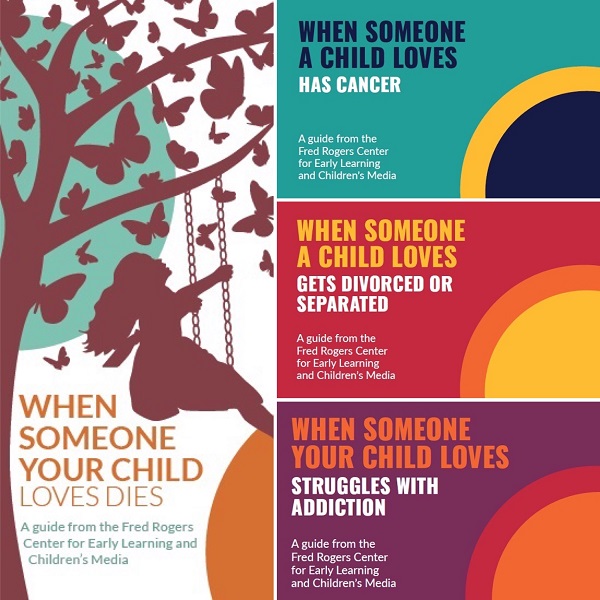
Look to Fred Rogers for help on talking to kids about death, addiction, cancer — and even a pandemic
Death, divorce, cancer, addiction. To a child, difficult family circumstances can be doubly traumatic. Some kids may not express the fear, anger and sadness that grief brings, so how do you draw out those feelings and show kids ways to cope with loss?
There’s help available on those four big issues from the Fred Rogers Center for Early Learning and Children’s Media at St. Vincent College. The Center first partnered with Excela Health to develop a website and brochure on death — “When Someone Your Child Loves Dies.” The curriculum for grief support groups is based on “Fred’s approach” to talking with kids. Now, Buncher Family Foundation is funding additional outreach on other sources of sadness and grief for kids: divorce, cancer and addiction.
Each began with a deep search through the Fred Rogers archives.
“His greatest gift was the idea that it’s possible to love and appreciate children for exactly who they are right now, in the moment, and not for who they will become someday,” says Dana Winters, director of Simple Interactions and Academic Programs at the center and assistant professor of child and family studies at St. Vincent.
When the bereavement brochure debuted in 2018, it quickly became popular. Since then, the center has distributed printed copies nationwide, mainly to funeral homes and hospice groups. 
The content was developed in consultation with social service agencies and child psychologists. The guidance for these significant life events could help parents talk with kids who are facing other causes for unhappiness. They’ve been worried about the pandemic and grieving from missing school friends, sports programs, proms and graduation ceremonies. News reports and overheard conversations about recent demonstrations and protests add to their uncertainty. The lessons and advice from Fred Rogers can be applied to all of these situations.
“We envision these brochures as being the starting point for conversations,” says Winters. “Everything Fred did was built on the idea that we can make what is mentionable, manageable. We can have conversations about hard things. Fred was an advocate who said it’s through relationships that we learn best and grow best. So the work that we do at the center is always based on that idea — that the human relationships between adults and children are the most important thing.”
Excela’s Home Care & Hospice offered grief support to children sporadically before it began working with the Fred Rogers Center, says Maureen Ceidro. She works as the bereavement coordinator and facilitator of Neighborhood Kids, a program that teaches grieving kids ages 5-14 how to express their emotions.
Ceidro marvels at the willingness of people to respond when you’re talking about children and grief.
“That’s been such a highlight for me,” she says. “At this point, we’re focusing on grief due to death, but we’re very aware there’s another level of children we need to reach.”
Through family-based therapy, Ceidro knows that many adults struggle to talk with their children about difficult topics. Kids sometimes won’t open up, so the Fred Rogers materials can be a conversation starter. They’re meant to promote interaction, to teach families how to communicate.
“The best thing we can do for our children during hard times is to be there for them,” recommends “When Someone Your Child Loves Dies.” “Let children know that it is okay to embrace and express their feelings, that they can come to you whenever they want to talk, and that you will be there to care for them.”
The advice works, Ceidro says, because “there’s something about it that’s very comforting, letting people know that they’re not alone, that there is someone out there and helpers are available for the things you’re experiencing. People worry, ‘Are we doing this right?’ ‘Is there something wrong with me, with my child?’ because grief gets you thinking that way, so it’s very much appreciated.”
Searching through Fred’s words
The Fred Rogers Center has no connection with the television show. Still, it keeps an archive with around 22,000 cataloged items, from scripts to “Mister Rogers’ Neighborhood” to his music compositions to speeches, books and letters he wrote and received.
“In the archives, we found that Fred did a lot about grief support and how to talk to children about grief,” says Winters. “We extend the legacy of Fred outside of the sweater. [He] gave us so much in the world of human development, and this was a way to take those writings and extend them into practice.”
Way back in the 1970s and ’80s, Rogers was talking about tough topics, such as divorce or how to handle a loved one’s cancer diagnosis. Today, it’s also hard to know what to say to a child when someone in the family has a substance abuse disorder, Winters says.
“Fred didn’t talk directly about addiction, but he gave us a foundation of how we talk with children about difficult ideas and topics, and we worked with community partners to make sure the content is relevant, applicable and accurate,” she says.
Printed brochures can be ordered from the center’s website. You can also download and print the materials as needed.
“This started as a local project, knowing that we had a need in our community, but it has extended throughout the country,” Winters says. “It’s one of the highest hits on our website.”
Individual websites have been launched for each topic, so that the brochure starts a conversation and the site makes available additional resources, such as a crisis hotline or where to find a support group.
People everywhere began rediscovering Fred Rogers in 2018, the 50th anniversary of “Mister Rogers’ Neighborhood.” Two movies — the documentary “Won’t You Be My Neighbor?” in 2018 and Tom Hanks’s “A Beautiful Day in the Neighborhood” in 2019 — sparked renewed interest in Rogers’s gifted teachings.
“It’s been a whirlwind,” says Winters. “We thought the ‘Year of Fred’ was going to end at the end of 2018, but it’s been nice to see this kind of resurgence. We hope that it moves beyond nostalgia for sweaters and sneakers and allows us to deeply engage with people who are rediscovering what a tremendous advocate for children and families that Fred Rogers really was.”
Advice highlights from Fred Rogers
Here are highlights of the subjects developed by the Fred Rogers Center. While the four subjects have points specific to their topics, you can recognize the universal qualities of some of the advice and how it can apply to other stressful situations. Click on the links to access the individual website and download the brochures.
Be open to questions. Try to answer your child’s questions as directly as you can. Know that your child may ask the same question over and over as they try to process and understand what is happening. If you are unsure of the answer or unsure of what to say, it is okay to say “I wonder about that, too.”
Stick to routines. Keeping the routines and expectations in your child’s life consistent can help them feel safe and secure in the face of the changes.
Share your own feelings. Sharing some of your own feelings with the child may show them that all feelings are okay and help them to learn ways to express their own feelings. You can help them see that hard feelings do not last forever and that even when difficult things are happening it is okay to have happy feelings, too.
Allow time and space for the child to play. Protecting and encouraging playtime sends the message to the child that you are taking care of things so that the child can feel safe and secure enough to play. Play is an important way that children express their feelings and learn about themselves and the world around them.
Being there for the child is what matters most. There are no perfect words and no perfect timing. Your care and attention is the most important thing for helping the child through the hard news and hard times.
Provide space for emotions. Some children may be very expressive with their emotions, some may be very reserved, and some may go back and forth between the two. As a caring adult in the child’s life, you can let them know all of this is okay, and that you are there if and when they want to share with you. You can share some of your own feelings with the child and talk about some things you do when you have big feelings – like listen to music, write, or talk to friends. Sometimes older children, especially, may feel most comfortable having conversations in the car, or on a walk.
Discuss the idea of change together. Let the child know that some things may change, and other things may stay the same, and be as honest as you can about what those changes will be. You can let the child know you will be there for them as they adjust to the changes.
Giving the child clear, concrete answers. Addressing a child’s concerns as soon as possible can help prevent them from creating fantasy answers that may be more worrisome than actual answers. It is okay if you don’t have an answer to a child’s question – you can let them know that you will answer their question as soon as you can, or offer to help find the answer together.
This story is part of the Kidsburgh Mental Health Series, funded by a grant from the Staunton Farm Foundation. The Foundation is dedicated to improving the lives of people who live with mental illness and/or substance use disorders. The Foundation’s vision is to invest in a future where behavioral health is understood, supported, and accepted.
Other stories in the series include the Kidsburgh Mental Health Survey report, insight as to how parents can deal with coronavirus anxiety, and advice on remaining resilient during times that try your family’s mental health. Check out the fascinating look at the teenage brain, Anchorpoint Counseling Ministry’s hugely successful fundraiser and the secret of happy, successful kids.

